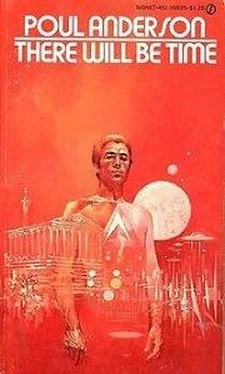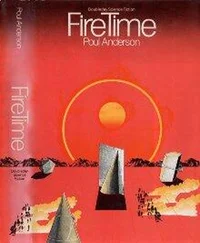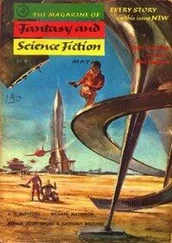Poul Anderson - There Will Be Time
Здесь есть возможность читать онлайн «Poul Anderson - There Will Be Time» весь текст электронной книги совершенно бесплатно (целиком полную версию без сокращений). В некоторых случаях можно слушать аудио, скачать через торрент в формате fb2 и присутствует краткое содержание. Год выпуска: 1972, Издательство: Doubleday, Жанр: Фантастика и фэнтези, на английском языке. Описание произведения, (предисловие) а так же отзывы посетителей доступны на портале библиотеки ЛибКат.
- Название:There Will Be Time
- Автор:
- Издательство:Doubleday
- Жанр:
- Год:1972
- ISBN:нет данных
- Рейтинг книги:5 / 5. Голосов: 1
-
Избранное:Добавить в избранное
- Отзывы:
-
Ваша оценка:
- 100
- 1
- 2
- 3
- 4
- 5
There Will Be Time: краткое содержание, описание и аннотация
Предлагаем к чтению аннотацию, описание, краткое содержание или предисловие (зависит от того, что написал сам автор книги «There Will Be Time»). Если вы не нашли необходимую информацию о книге — напишите в комментариях, мы постараемся отыскать её.
Nominated for Hugo Award for Best Novel in 1973.
There Will Be Time — читать онлайн бесплатно полную книгу (весь текст) целиком
Ниже представлен текст книги, разбитый по страницам. Система сохранения места последней прочитанной страницы, позволяет с удобством читать онлайн бесплатно книгу «There Will Be Time», без необходимости каждый раз заново искать на чём Вы остановились. Поставьте закладку, и сможете в любой момент перейти на страницу, на которой закончили чтение.
Интервал:
Закладка:
He ate a good though lonely dinner, and in his luxurious though lonely chamber took a sleeping pill. He needed to be rested before he embarked.
Constantinople, late afternoon on the thirteenth of April, 1204. Havig emerged in an alley downhill from his destination. Silence pressed upon him-no slap of buskins, clop of hoofs, rumble and squeal of cartwheels, no song of bells, no voices talking, chattering, laughing, dreaming aloud, no children at their immemorial small games. But the stillness had background, a distant jagged roar which was fire and human shrieking, the nearer desperate bark of a dog.
He made ready. The gun, a 9-mm Smith Wesson mule-killer, he holstered at his waist. Extra ammunition he put in the deep pockets of his jacket. Kit and chronolog he strapped together in an aluminum packframe which went on his back.
Entering the street, he saw closed doors, shuttered windows. Most dwellers were huddled inside, hungry, thirsty, endlessly at prayer. The average place wasn’t worth breaking into, except for the pleasures of rape, murder, torture, and arson. True, this was the district of the goldsmiths. But not every building, or even a majority, belonged to one. Residential sections were not based on economic status; the poor could be anywhere. With booths and other displays removed, you couldn’t tell if a particular façade concealed wealth or a tenement house — until, of course, you clapped hands on a local person and wrenched the information out of him.
Evidently those who rushed the Manasses home were in advance of the mobs which would surely boil hither as soon as palace and church buildings were stripped. Were they here yet? Havig hadn’t been sure of the exact time when he saw them.
He trotted around a corner. A man lay dead of a stab wound. His right arm reached across his back, pulled from its socket. A shabby-clad woman crouched above him. As Havig passed, she screamed: “Wasn’t it enough that you made him betray our neighbor? In Christ’s name, wasn’t that enough?”
No, he thought. There was also the peculiar thrill in extinguishing a life.
He went on by. The agony he had seen earlier returned to him in so monstrous a flood that the tears of this widow were lost. He could do nothing for her; trousers, short hair, shaven chin marked him a Frank in her eyes. When he was born, she and her grief were seven hundred years forgotten.
At least, he thought, he knew how the Crusaders had located Doukas’s shop. One among them must understand some Greek, and their band had decided to seek out this part of town ahead of the rush. He knew also that his scheduling was approximately right.
Yells, clangor, and a terrible stammer reverberated wall to wall, off the cobbles, up to soot-befouled heaven. He stretched lips over teeth. “Yeah,” he muttered, “I got it exactly right.”
He quickened his pace. His younger self would be gone by the time he arrived. Obvious: he had not seen his later self. He didn’t want that house unwatched for many minutes.
Not after considering what sort of man the average Eyrie warrior was.
The street of his goal was steep. Gravity dragged at him. He threw his muscles against it. His bootsoles thudded like his heart. His mouth was dry. Smoke stung his nostrils.
There!
One of the wounded Crusaders saw him, struggled to his knees, raised arms. Blood shone its wild red, hiding the cross on the surcoat, dripping in thick gouts to the stones. “Ami,” croaked from a face contorted out of shape, on whose waxen-ness the beard stubble stood blue. “Frère par lesu-” The other survivor could merely groan, over and over.
Havig felt an impulse to kick their teeth in, and immediate shame. Mortal combat corrupts, and war corrupts absolutely. He ignored the kneeling man, who slumped behind him; he lifted both hands and shouted in English:
“Hold your fire! I am from the Eyrie! Inspection! Hold your fire and let me in!” Not without a tightness in his own unriddled guts, he approached the doorway.
An oxcart stood by, the animal tethered to a bracket which had formerly upheld Doukas’s sign, twitching its ears against flies and with mild interest watching the Crusaders die. It would have been arranged for beforehand, to bring gold and silver and precious stones, ikons and ornaments and bridal chaplets, down to the ship which waited. Havig wasn’t the only traveler who had been busy in the years before today. An operation like this took a great deal of work.
Nobody guarded the entrance. Armed as they were, the agents could deal with interference, not that any such attempt would be made. Havig stopped. Scowling, he examined the door. It was massive, and had surely been barred. The Franks had doubtless meant to chop their way in. But at the point when Havig glimpsed them and halted for a clear look, it had stood open. That was one fact which had never stopped plaguing him.
From the way it sagged on its hinges, scorched and half splintered, Wallis’s boys must have used a dynamite charge. That had been done so quickly that, in Havig’s dim chronokinetic sight, their arrival had blurred together with that of the Franks a few minutes afterward.
Why had they forced an entrance? Such impatience would panic the household, complicate the task of assisting it to safety.
A scream fled down the rooms inside: “No, oh, no, please!” in Greek and Xenia’s voice, followed by an oath and a guffaw. Havig crouched back as if stabbed.
In spite of everything, he had come late. At the moment of his arrival, the agents had already blown down the door and entered. They’d posted a man here to await the plunderers whom Havig had reported. Now he’d gone back within to join the fun.
For an instant which had no end, Havig cursed his own stupidity. Or naïveté-he was new to this kind of thing, bound to overlook essentials. To hell with that. Here he was and now he was, and his duty was to save whatever might be left.
His call must not have been noticed. He repeated it while he went through the remembered house. That sobbed-out cry for mercy had come from the largest chamber, which was the main workshop and storeroom.
Family, apprentices, and servants had been brought together there. It was more light and airy than usual in Byzantium, for a door and broad windows opened on the patio. Yonder the fountain still tinkled and twinkled, oranges glowed amid darkgreen leaves, Eastertide flowerbeds were budding, the bust of Constantine stood in eternal embarrassment. Here, on shelves and tables, everywhere crowded that beauty which Doukas Manasses had seen to the making of.
He sprawled near the entrance. His skull was split open. The blood had spread far, making the floor slippery, staining footwear which then left crimson tracks. But much had soaked into his robe and white beard. One hand still held a tiny anvil, with which he must have tried to defend his women.
Four agents were present, dressed as Crusaders. In a flash, Havig knew them. Mendoza, of the Tijuana underworld in his own century, who had been among those who went to Jerusalem, was in charge. He was ordering the natives to start collecting loot. Moriarty, nineteenth-century Brooklyn gangster, kept guard, submachine gun at the ready. Hans, sixteenth-century Landsknecht, watched Coenraad of Brabant, who had wanted to draw sword and save the Savior, struggle with Xenia.
The girl screamed and screamed. She was only fourteen. Her hair had fallen loose. Sweat and tears plastered locks to her face. Coenraad grasped her around the waist. His free hand ripped at her gown. A war hammer, stuck in his belt, dripped blood and brains.
“Me next,” Hans grinned. “Me next.”
Coenraad bore Xenia down to the wet floor and fumbled with his trousers. Anna, who had stood as if blind and deaf near the body of her husband, wailed. She scuttled toward her daughter. Hans decked her with a single blow. “Maybe you later,” he said.
Читать дальшеИнтервал:
Закладка:
Похожие книги на «There Will Be Time»
Представляем Вашему вниманию похожие книги на «There Will Be Time» списком для выбора. Мы отобрали схожую по названию и смыслу литературу в надежде предоставить читателям больше вариантов отыскать новые, интересные, ещё непрочитанные произведения.
Обсуждение, отзывы о книге «There Will Be Time» и просто собственные мнения читателей. Оставьте ваши комментарии, напишите, что Вы думаете о произведении, его смысле или главных героях. Укажите что конкретно понравилось, а что нет, и почему Вы так считаете.












